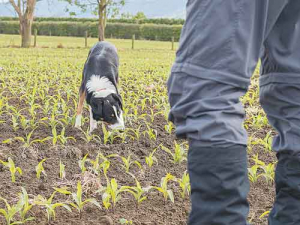Waikato dairy effluent breaches lead to $108,000 in fines
Two farmers and two farming companies were recently convicted and fined a total of $108,000 for environmental offending.
 Rusty and his handler John Taylor helped to sniff out velvetleaf on eight Waikato farms last month. They will return in late January-early February.
Rusty and his handler John Taylor helped to sniff out velvetleaf on eight Waikato farms last month. They will return in late January-early February.
Landowners and rural contractors are being urged to watch for pest plants.
Warm, humid weather means velvetleaf and other weeds will start appearing on farms, says Waikato Regional Council (WRC).
Helping to sniff out velvetleaf in Waikato last month was Rusty and his handler John Taylor, from Southland. They visited 12 high-risk farms, finding plants sprouting on eight of them. They’ll be back to do more work in late January and early February.
WRC’s biosecurity pest plants team leader Darion Embling says the wet winter and spring has delayed planting by farmers, but crops are now growing and now is the time to watch for and kill pest plants.
“Most farmers have done pre-emergence spraying but we’re hearing from those previously confirmed with velvetleaf infestations that seedlings are pushing through.
“This is a critical time for killing pest plants; hand-pulling seedlings and post-emergence spraying is essential.”
Landowners and rural contractors should look around gateways and the first 3-4 rows of crops for signs of velvetleaf. They can notify WRC for advice to avoid crop loss.
Seedlings are vigorous, with plants left untouched growing rapidly in the first few weeks after germination. Leaves are heart-shaped and velvety to the touch, and have a distinctive smell when crushed.
Velvetleaf grows up to 2.5m tall and has buttery-yellow flowers as it matures from spring to autumn.
This aggressive cropping weed is among the world’s worst. It competes with crops for nutrients, space and water, and its seeds can persist on farms for decades, even surviving digestion and silage.
Agrisea NZ has appointed Craig Hudson as it's new chief growth officer.
State farmer Landcorp, trading as Pamu, is a forecasting a full-year net profit of around $100 million.
Tony Aitken, chief executive of Ruralco, has been awarded the Excellence in Business Leadership Award at the ANZ Business of the Year Awards.
Global trade has been thrown into another bout of uncertainty following the overnight ruling by US Supreme Court, striking down President Donald Trump's decision to impose additional tariffs on trading partners.
Controls on the movement of fruit and vegetables in the Auckland suburb of Mt Roskill have been lifted.
Fonterra farmer shareholders and unit holders are in line for another payment in April.